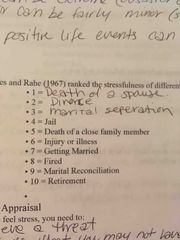![]()
![]()
![]()
Use LEFT and RIGHT arrow keys to navigate between flashcards;
Use UP and DOWN arrow keys to flip the card;
H to show hint;
A reads text to speech;
33 Cards in this Set
- Front
- Back
|
Health psych |
Seeks to understand how biological, psychological and environmental and culture factors are included in the promotion of physical health and prevention of illness |
|
|
Stress |
Physical and psychological reactions to demanding or threatening situations |
|
|
Stressors |
The demanding or threatening situations that cause the stress |
|
|
Who in Canada is more stressed than the average population? |
University students 1st years |
|
|
Significant life changes |
Certain events in our lives are virtually guaranteed to produce stress Death of loved one Getting fired Changes to everyday life Can be major and minor Can be positive - babies and weddings |
|
|
Holmes and rahe ranks |

Back (Definition) |
|
|
Cognitive appraisal |
Perceive a threat Conclude that you may not have the resources to deal with the threat |
|
|
External factors |
Daily hassle Environmental factors - noise and crowding Also heat |
|
|
Internal sources |
Perceived control— Amount of influence you feel you have More perceived control = less stress |
|
|
Perceived control is stronger in |
Western cultures then eastern cultures |
|
|
Self efficacy |
Belief in ones ability to arty putt specific actions that produce desired outcomes |
|
|
Self efficacy predicts |
# of important health behaviours Quit smoking lose weight ... |
|
|
Personal characteristics |
Some people are more likely to seek help in stressful situations |
|
|
Optimism |
People who have an optimistic viewpoint on like tend to react better to stress |
|
|
Type A |
Competitive, control oriented, impatient, hostile |
|
|
Type B |
Typically patient relaxed and noncompetitive |
|
|
Resilience |
You ability to recover from negative experiences and adapt to demands of life |
|
|
General adaptation syndrome |
People are biologically programmed to react to threats in three stages Alarm resistance exhaustion |
|
|
Alarm |
Fight or flight Body energised Heart rate increased, blood flow to muscle increase Body goes on defence |
|
|
Resistance |
Body adjusts to cope with threat Arousal levels remain high but body is able to replenish resources |
|
|
Exhaustion |
Energy depletes Body gives up |
|
|
Emotional reactions |
Typically fear and anger |
|
|
Psychological benefits |
Learning empathy Gaining confidence in problem solving |
|
|
Gender differences |
There isn’t one ✌️ For basic physiological reactions |
|
|
Females |
Tending and protecting rather than fight or flight |
|
|
Prolonged physical consequences |
Immune system lowered 27percent non stressed 50 percent stressed Got the cold |
|
|
Cancer links |
Stressed rats got an increase |
|
|
Psychological prolonged consequences |
Anxious, out of control, drained eventually sad and depressed Overtime serious problems can form Reduced willpower to stay away from unhealthy behaviour |
|
|
Most people pver time |
Do not developers lasting psychological problems |
|
|
PTSD |
Anxiety disorder characterised by flash backs |
|
|
Flashbacks |
Person relieves traumatic event in some way Avoidance of stimuli associated with trauma Chronic arousal |
|
|
PTSD rarity |
Women are 5 times more likely to develop ptsd following traumatic events |
|
|
Burnout |
Occurs with continuous stress that is demanding but not traumatic Physical emotional and mental exhaustion More common in stressful jobs Common with those who identify with job and think they will lose meaning without it |

